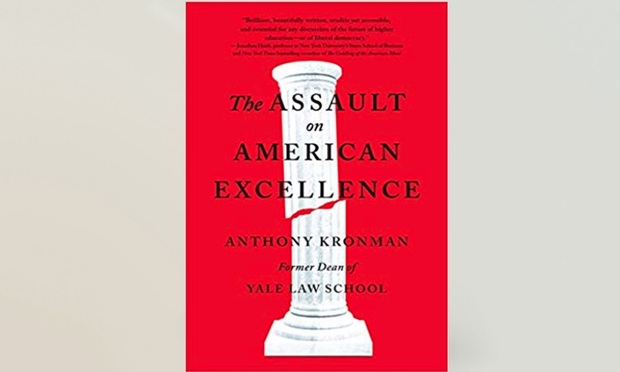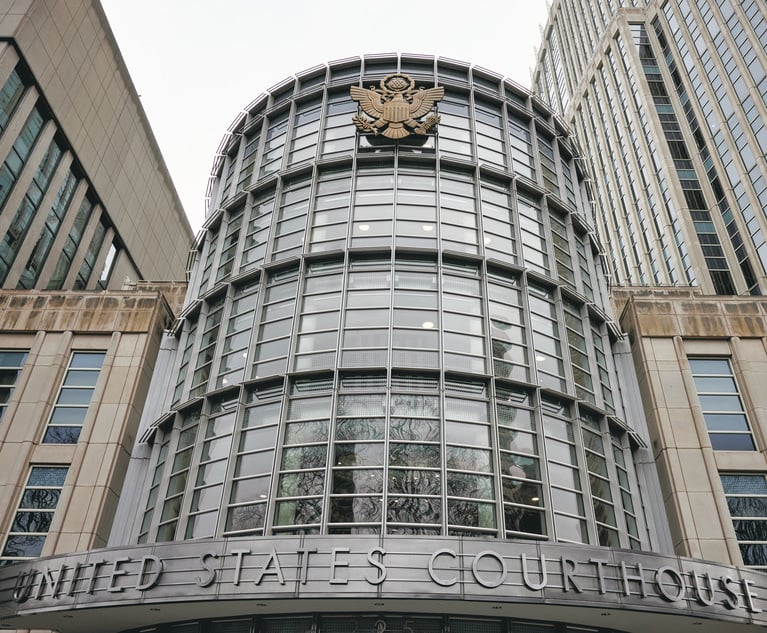A Call for Higher Education Reform
Former Yale Law School Dean, Anthony Kronman, echoes the role of a latter-day prophet, boldly urging reform of the fault lines that he sees fracturing higher education today. His "Assault on American Excellence" is an expository defense of aristocratic educational excellence.
October 11, 2019 at 11:55 AM
6 minute read
 'The Assault on American Excellence'
'The Assault on American Excellence'
By Anthony Kronman
Free Press, 2019, 288 pages, $27
St. John the Baptist is often described as a Biblical voice crying in the desert wilderness, with a woeful message of "Repent." Former Yale Law School Dean, Anthony Kronman, echoes the role of a latter-day prophet, boldly urging reform of the fault lines that he sees fracturing higher education today. His "Assault on American Excellence" is an expository defense of aristocratic educational excellence.
This fine book comes on the heels of another outstanding Law School Dean, John Sexton (later President of NYU), whose book "Standing for Reason: The University in a Dogmatic Age" sounds some similar alarms ("A Call to Bring Sacred Values Into the Fabric of a University," N.Y.L.J., Book Review, June 26, 2019). The Kronman book, however, is even more sweeping in its criticisms of some of the spiraling deficiencies he has witnessed across his four decades at Yale, and across the national quads of higher education.
I open my review of Kronman's book with a hopeful exhortation in his Epilogue: "our colleges and universities are not political institutions [and] *** their work is not the pursuit of politics by other means." [They] "make it [democracy] stronger by respecting themselves and the humanistic habits they convey from teacher to student. *** The real danger of the present hour *** [is] democratizing the inner life of our colleges and universities so that the rule of equality that prevails outside them comes to be the norm in the now masterless world of teaching and learning as well. What a grievous loss that would be: for our students, their schools, the country at large. Enough is enough. It is time to rally round the ivory tower" (emphasis added).
My wistful comment is simply: "If only!"
The book is well-organized in chapters that run up to that peroration. They roll out in clear prose, avoiding academic jargon, the state of deconstruction that modern trends are inflicting of the Aristotelian-Socratic gold standard of excellence. The search for truth, says this author, is not "democratic" and not found by a show of hands that shoot up under the banner of "aggressive egalitarianism." That core critique, by the way, takes nothing away from the respect and appreciation of the politics of democracy. Instead, Kronman rejects the mistaken intermingling of the two discreet disciplines.
Now looking at the beginning of the book, I note that the introduction sets the stage for the unmasking of what the author describes as his first take on the controversies swirling around campuses: that the debate about elimination of the rank of "Master" in the residential colleges of Yale University was a "silliness," "a tempest in a teapot," and "a ridiculous exaggeration of wounded feelings, anguished responses and inflated moral concerns." Subsequent events made him realize that the foolishness was for real, serious, and pervasive. If there were to be no more "Masters," then there might be no more "Master Classes," even though those elegant terms denote earned educational rank and accomplishment. They are discarded because some sensitive individuals treat them as connoting emotional pain from some mistaken transference of past essentially different usage and meaning.
The four chapters are brisk (even brusque, in spots) and cover slightly over 200 pages. They take the reader through the dispiriting denigration of Excellence and the attacks against Speech and Memory. The counts of Kronman's devastating indictment present evidence to prove guilt of loss of direction and diminished value in the education of students.
Kronman demonstrates that Universities have historically (a whole chapter on the curiously nettlesome value of "history," titled "Memory") provided "a community devoted to the collaborative and vibrant pursuit of truth" [a conversational gathering], not a cautious or circumspect one; one that should foster the Socratic ideal of an [genuine] aristocracy of truth seekers." They should not be, as the author views they have become, an alternative universe of "political debate." His heroes and evidence for the important demarcation of the campus against democratic forum are Aristotle, John Adams, DeTocqueville, Holmes, Mencken, Moynihan, and even Babbitt, sprinkled interestingly with wonderful quotations throughout the book.
His villains, on the other hand, are those who would suppress and suffocate speech and ideas; denigrate high standards of excellence and achievement with a false idolatry of "aggressive egalitarianism;" exalt a different trigger word, "diversity," for its own sake without standards; scrub and judge history with a blind eye to its nuances, anomalies, mistakes—warts and all—discounting the extraordinary advances and accomplishments of every past era. The current fashion is to treat history as though the bully-pulpit of the moment is all that matters, forgetting that future generations will look back similarly, if that is the norm.
Kronman sees the current phenomenon as a fight for "the soul of the humanities," sharing Holmes' warning about the "effervescence of democratic negation." The sacrifice of Master and Master Class Teaching eventually brought a self-described liberal progressive, the author—and, through his apologia, his readers—to the realization that undifferentiated equality flattens out to a universal mediocrity. That unintended consequence ill serves everyone, the true educational goal, and the outside space of political democracy. He deplores this trend towards "silly coddling, in the form of trigger warnings, safe spaces" and the like.
There is much to learn and enjoy—and even be frightened and appalled by—in this cri de coeur book.
I close my review, as I opened, with a reference to a saint—the newly and formally canonized John Henry Cardinal Newman. His renowned book from a century and half ago is "The Idea of a University." Reflecting on Kronman's book in the historical light of Newman's re-assures me that the new saint would love Dean-Professor Kronman's summons to the better angels of the educational enterprise for modern times.
Newman's metaphor for the educational process is a river that begins as a small stream that rushes forward to widen and deepen through space, time, and growth on the journey downstream. He would be disappointed to learn from Kronman's book that the dogmatic tides of higher education have now reversed the flow regressively narrowing the open river. That river course runs counter to the nature and raison d'etre of education—the open-mouthed pursuit of knowledge and excellence.
Joseph W. Bellacosa is a retired judge of the New York Court of Appeals.
This content has been archived. It is available through our partners, LexisNexis® and Bloomberg Law.
To view this content, please continue to their sites.
Not a Lexis Subscriber?
Subscribe Now
Not a Bloomberg Law Subscriber?
Subscribe Now
NOT FOR REPRINT
© 2025 ALM Global, LLC, All Rights Reserved. Request academic re-use from www.copyright.com. All other uses, submit a request to [email protected]. For more information visit Asset & Logo Licensing.
You Might Like
View All
The Met Hires GC of Elite University as Next Legal Chief

NY Appellate Panel Cites Student's Disciplinary History While Sending Negligence Claim Against School District to Trial

'No Evidence'?: Big Law Firms Defend Academic Publishers in EDNY Antitrust Case
3 minute read
'Substantive Deficiencies': Judge Grants Big Law Motion Dismissing Ivy League Price-Fixing Claims
3 minute readTrending Stories
- 1ACC CLO Survey Waves Warning Flags for Boards
- 2States Accuse Trump of Thwarting Court's Funding Restoration Order
- 3Microsoft Becomes Latest Tech Company to Face Claims of Stealing Marketing Commissions From Influencers
- 4Coral Gables Attorney Busted for Stalking Lawyer
- 5Trump's DOJ Delays Releasing Jan. 6 FBI Agents List Under Consent Order
Who Got The Work
J. Brugh Lower of Gibbons has entered an appearance for industrial equipment supplier Devco Corporation in a pending trademark infringement lawsuit. The suit, accusing the defendant of selling knock-off Graco products, was filed Dec. 18 in New Jersey District Court by Rivkin Radler on behalf of Graco Inc. and Graco Minnesota. The case, assigned to U.S. District Judge Zahid N. Quraishi, is 3:24-cv-11294, Graco Inc. et al v. Devco Corporation.
Who Got The Work
Rebecca Maller-Stein and Kent A. Yalowitz of Arnold & Porter Kaye Scholer have entered their appearances for Hanaco Venture Capital and its executives, Lior Prosor and David Frankel, in a pending securities lawsuit. The action, filed on Dec. 24 in New York Southern District Court by Zell, Aron & Co. on behalf of Goldeneye Advisors, accuses the defendants of negligently and fraudulently managing the plaintiff's $1 million investment. The case, assigned to U.S. District Judge Vernon S. Broderick, is 1:24-cv-09918, Goldeneye Advisors, LLC v. Hanaco Venture Capital, Ltd. et al.
Who Got The Work
Attorneys from A&O Shearman has stepped in as defense counsel for Toronto-Dominion Bank and other defendants in a pending securities class action. The suit, filed Dec. 11 in New York Southern District Court by Bleichmar Fonti & Auld, accuses the defendants of concealing the bank's 'pervasive' deficiencies in regards to its compliance with the Bank Secrecy Act and the quality of its anti-money laundering controls. The case, assigned to U.S. District Judge Arun Subramanian, is 1:24-cv-09445, Gonzalez v. The Toronto-Dominion Bank et al.
Who Got The Work
Crown Castle International, a Pennsylvania company providing shared communications infrastructure, has turned to Luke D. Wolf of Gordon Rees Scully Mansukhani to fend off a pending breach-of-contract lawsuit. The court action, filed Nov. 25 in Michigan Eastern District Court by Hooper Hathaway PC on behalf of The Town Residences LLC, accuses Crown Castle of failing to transfer approximately $30,000 in utility payments from T-Mobile in breach of a roof-top lease and assignment agreement. The case, assigned to U.S. District Judge Susan K. Declercq, is 2:24-cv-13131, The Town Residences LLC v. T-Mobile US, Inc. et al.
Who Got The Work
Wilfred P. Coronato and Daniel M. Schwartz of McCarter & English have stepped in as defense counsel to Electrolux Home Products Inc. in a pending product liability lawsuit. The court action, filed Nov. 26 in New York Eastern District Court by Poulos Lopiccolo PC and Nagel Rice LLP on behalf of David Stern, alleges that the defendant's refrigerators’ drawers and shelving repeatedly break and fall apart within months after purchase. The case, assigned to U.S. District Judge Joan M. Azrack, is 2:24-cv-08204, Stern v. Electrolux Home Products, Inc.
Featured Firms
Law Offices of Gary Martin Hays & Associates, P.C.
(470) 294-1674
Law Offices of Mark E. Salomone
(857) 444-6468
Smith & Hassler
(713) 739-1250






